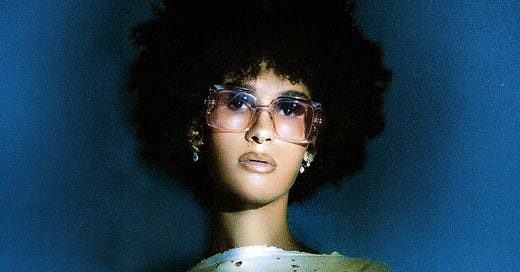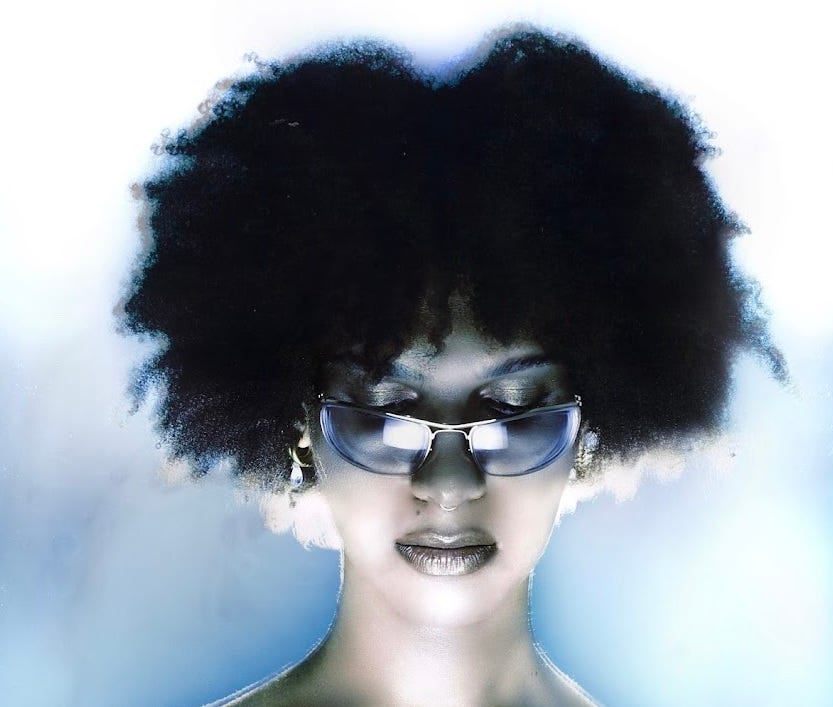#2 Deeper Into Out of Space | TAAHLIAH
The Scottish artist, producer and DJ on queer nightlife culture and why more needs to be done to make club spaces safer...
“Creating a safe space in a club isn’t as simple as printing a poster about how to behave and putting it on the wall,” says Scottish DJ and producer TAAHLIAH.
“It’s just not as easy as that,” she continues. “If it was, then no one would ever be harassed.”
As a Black, trans Glaswegian-based artist, TAAHLIAH is pushing against some of the narratives and conventions surrounding club culture with a genre-straddling sound and aesthetic.
Alongside her DJ sets, it’s TAAHLIAH’s productions - perhaps best heard on the AIM Award winning ‘Angelica’ - setting the bar.
Tracks such as ‘Brave’ are deeply personal moments, pooling strands of rave DNA, experimental flashes and fluorescent pop music in a similar vein to the sadly departed SOPHIE. Alongside a nomination for the Scottish Album of the Year Award, TAAHLIAH was the first Black trans artist to be nominated at the Scottish Alternative Music Awards, and the first artist to ever be nominated and win in two categories in the same year. Throw in a viral Boiler Room set and a collaboration with the London Contemporary Orchestra, and she is continuing to uncover bold creative spaces. TAAHLIAH believes nightlife needs to catch up, reflect the widening diversity of participants within the scene and be genuinely future-facing if it is be welcoming to all.
“I’m Black and trans and perhaps apart from Honey Dijon, who inhabits a different place to me in terms of music, I just cannot think of anyone who I can identify with in a similar kind of way,” she says.
“These days in the world of nightclubs, not everyone is straight, white and male. So there needs to be an effort to make sure these spaces are safe for all - the amount of time I’ve played in places and received shit, it just shouldn’t happen.”
Kilmarnock | Glasgow | Berlin
Originally from Kilmarnock to the west of Scotland, TAAHLIAH’s first exposures to dance music came via her trance-loving dad’s record collection, but she cites a lack of interesting nightlife options in her hometown.
Instead, her first opportunity to experience dance music came on upping sticks and moving to Glasgow in 2017.
“There wasn’t really a scene for dance music there in Kilmarnock,” she says. “My interest in electronic music came through an indie context and how the different bands and artists I was into as a 15 year old on Tmblr implemented these sounds in their own work.”
TAAHLIAH went to Glasgow as an art student and spent time at the (now closed) Arts School and SWG3. It was through immersing herself deeper within the city’s electronic music scene that she furthered her knowledge of artists and DJs.
“I spent time in open spaces where they would play pop one night, techno the next and experimental or jazzy the one after,” TAAHLIAH says of her nocturnal forays.
“I think when you always go to one specific place just known for playing one type of music, it can be very hegemonic. You can become a victim of not allowing yourself to critique a place.”
“I was very much into going anywhere and everywhere to get a more expansive experience of what Glasgow had to offer at the time.”
Alongside her life in Glasgow, TAAHLIAH also moved to Berlin as part of her studies where she found herself venturing to an array of nights, clubs and venues in the city.
“Of course, I spent a lot of time in Berghain,” she says. “But I went to a few DIY spaces too where it was less focused on this sense of institution. Clubbing in Germany certainly expanded my knowledge but I was younger and inhabited a different headspace to how I feel now.”
Venerated venues such as Berghain or the Sub Club in Glasgow are clubs with histories and stories that are as influential as the established sounds they are known for. Over the years, TAAHLIAH has frequented and enjoyed both but has invested time in seeking alternative experiences too.
“These spaces have such a reputation attached to them and of course many people visit to enjoy that experience multiple times. But I haven’t been to Sub Club for five years. My view of the space was as I was then which is very different to who I am now.”
Community and Identity
The mix-up of community and identity are essential elements in TAAHLIAH’s take on nightlife and club culture. For her, nightclubs as important spaces for queer groups to congregate and find each other in a city the size of Glasgow.
“Accessing this community can be hard and the easiest way to do it is to go out,” TAAHLIAH explains. “I never intended to be a music artist and definitely found parts of myself in going out and meeting other people.”
A burgeoning queer scene is bubbling within Glasgow’s electronic music scene and, according to TAAHLIAH, hardcore with its energy and intense bpm is becoming a dominant sound in the city’s nocturnal soundtrack.
“Compared to a few years ago, there are so many hardcore nights and they all have this air of queerness to it,” she says.
“This sense of queerness comes through the resurgence of hyperpop which has infiltrated rave tunes, hard techno and hardcore. And queerness has always been attached to nightlife which has always been attached to community.”
A Lack of Afters
While this community is close-knit, the authorities in Glasgow, as in other cities across the UK, are making it tough for nightlife to exist. We’ve all seen the horror stories around club closures and recent stats are some of the most concerning.
A third of nightclubs in the UK closed down between the start of the pandemic and the end of 2022, a new report has revealed. This adds up to the closure of 4,800 nightclubs during this period.
“Those in charge definitely make it more challenging than it needs to be,” says TAAHLIAH of the current landscape of life after dark. “They have a very reductive view of nightlife and clearly don’t appreciate it for what it is. That’s why clubs shut at 3 or 4am here as opposed to the looser licensing in London and elsewhere in Europe.”
There is a lack of after party venues in the city compared with pre-Covid too. This dearth of spaces to head to after clubs have closed puts certain pressures on ravers to squeeze as much out of their night as possible in a condensed period of time.
“If you want to party, you just don’t have much time to do it,” says TAAHLIAH. “Now there is a reliance on afters in people’s flats and homes which can be daunting. People can also get messy quickly due to the perceived brevity of their night and are sometimes just chucked out onto the street. Dancers should be able to party and know they will be looked after.”
Some club spaces are aware, engaged and operating in a way where care for their clubbers is paramount. TAAHLIAH uses Bonjour, a queer owned bar, club, and community space in Saltmarket, Glasgow as a great example in the way they look after their crowd.
“It just underlines how queer people are always at the forefront of taking action and looking to implement a better view of clubbing,” she states.
“I do love Stereo and SWG3 too. With the latter, it’s so multi-purpose it feels like it has the potential to be anything it wants to be. Due to its location outside the centre of town, people don’t attend unless they now what they are going to which can filter out those who are just coming to get fucked up.”
Original Artist Material
As an artist, TAAHLIAH’s ambitions for 2023 centre around taking her music into a live setting. Her sound covers a broad spectrum of styles, moving from the melodic hooks of ‘Fall Into Place’ to the tougher, more banging likes of ‘FMH’. While certain producers seek direct inspiration in the world around them, she finds energies from inside herself.
“My music-making is very internalised, often based on what I’m thinking about and how I’m feeling at the time,” she says. “I do become more insular during winter, then my music gets more expansive and hopeful in the summer. It’s often about who I have around me rather than where I am too.”
“I’m excited about my live sets and how they can perpetuate the idea of me as an artist more than a DJ,” she continues. “Being a DJ is great and I love how it allows me to enter these spaces and experience club culture but the thing I enjoy the most is making music.”
Against the current backdrop of perpetual landscape of crisis and rising costs, how does she view the future of club culture? While TAAHLIAH anticipates a “real resurgence of hedonism” at some point once the cost of living crisis has ceased to be as turbulent, she says there needs to be systemic change for its future and of those of the marginalised communities surrounding nightlife to be sustained.
“As we shift as a culture, people who inhabit queer identities are becoming artists and coming to the fore like we’ve never seen before,” she says.
“And if a person sees someone like them performing amazing music that they can identify with, then they will want to go and see them. Queer artists will attract queer people - and those people need to feel safe. Ultimately, there needs to be much effort put into this if our culture is to move forward.”
Visit taahliah.bandcamp.com and the untitled (recs) site for more information on TAAHLIAH and her music.
Listen to ‘Fuck It’ (feat. Loraine James) below:




